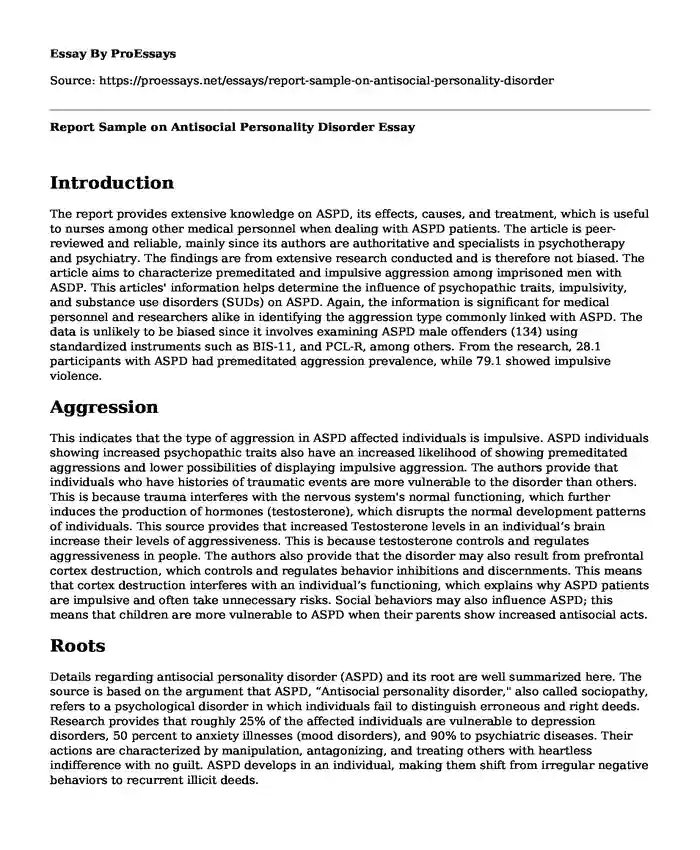Introduction
The report provides extensive knowledge on ASPD, its effects, causes, and treatment, which is useful to nurses among other medical personnel when dealing with ASPD patients. The article is peer-reviewed and reliable, mainly since its authors are authoritative and specialists in psychotherapy and psychiatry. The findings are from extensive research conducted and is therefore not biased. The article aims to characterize premeditated and impulsive aggression among imprisoned men with ASDP. This articles' information helps determine the influence of psychopathic traits, impulsivity, and substance use disorders (SUDs) on ASPD. Again, the information is significant for medical personnel and researchers alike in identifying the aggression type commonly linked with ASPD. The data is unlikely to be biased since it involves examining ASPD male offenders (134) using standardized instruments such as BIS-11, and PCL-R, among others. From the research, 28.1 participants with ASPD had premeditated aggression prevalence, while 79.1 showed impulsive violence.
Aggression
This indicates that the type of aggression in ASPD affected individuals is impulsive. ASPD individuals showing increased psychopathic traits also have an increased likelihood of showing premeditated aggressions and lower possibilities of displaying impulsive aggression. The authors provide that individuals who have histories of traumatic events are more vulnerable to the disorder than others. This is because trauma interferes with the nervous system's normal functioning, which further induces the production of hormones (testosterone), which disrupts the normal development patterns of individuals. This source provides that increased Testosterone levels in an individual’s brain increase their levels of aggressiveness. This is because testosterone controls and regulates aggressiveness in people. The authors also provide that the disorder may also result from prefrontal cortex destruction, which controls and regulates behavior inhibitions and discernments. This means that cortex destruction interferes with an individual’s functioning, which explains why ASPD patients are impulsive and often take unnecessary risks. Social behaviors may also influence ASPD; this means that children are more vulnerable to ASPD when their parents show increased antisocial acts.
Roots
Details regarding antisocial personality disorder (ASPD) and its root are well summarized here. The source is based on the argument that ASPD, “Antisocial personality disorder," also called sociopathy, refers to a psychological disorder in which individuals fail to distinguish erroneous and right deeds. Research provides that roughly 25% of the affected individuals are vulnerable to depression disorders, 50 percent to anxiety illnesses (mood disorders), and 90% to psychiatric diseases. Their actions are characterized by manipulation, antagonizing, and treating others with heartless indifference with no guilt. ASPD develops in an individual, making them shift from irregular negative behaviors to recurrent illicit deeds.
The authors have their argument based on the fact that the disorder may develop unnoticed in children's childhoods, after which it affects an individual in adulthood. Approximately 80% of affected individuals had their initial ASPD symptoms while aged 8-11. In children, the disorder is characterized by setting fires and cruelty. The critics agree that MBT, "mentalization-based treatments," effectively minimize the effects of ASPD symptoms. This source is intended for nurses and other medical personnel to understand more about ASPD and possible treatments. Information is from various works of research and is current, which means it can be trusted. It mainly investigates treatments such as MBT for patients with personality disorders. The participants incorporated were examined through SCID-11 and SCID-1, "structured clinical interviews with regard to DSM-IV," which further means the information is not biased and is reliable.
Conclusion
Men are more vulnerable to ASPD than females in the ratio of 3:1. Males also experience their initial symptoms earlier compared to girls who can experience ASPD symptoms after puberty. The relationship between CD and ASPD is also examined in the article. The article provides that children aged 15 with no (CD) antisocial behaviors are unlikely to suffer from ASPD. Individuals affected by ASPD also show vulnerability to other physical and psychological health problems, which hinders their productivities in their social lives and businesses. This explains why most of them reveal having an instance of reduced performances and broken relationships in their past. ASPD is associated with illnesses such as attention shortage hyperactivity, post-traumatic anxiety, borderline personality diseases, conduct disorder, and bipolar disorders, among others. ith challenging situations, and focus on specific future goals and aims. ASPD treatments have not been determined, and therefore physicians provide medications for other conditions linked with ASPD, for instance, aggression symptoms, depression, and anxiety. Fluoxetine and Sertraline are also useful in minimizing aggression and irritability. Diagnosis is also done, putting into consideration a patient’s history and level of damage.
References
Houser, M. C. (2015). A history of antisocial personality disorder in the diagnostic and statistical manual of mental illness and treatment from a rehabilitation perspective. Carbondale, Il, USA. Retrieve from: https://opensiuc.lib.siu.edu/cgi/viewcontent.cgi?article=1795&context=gs_rp.
Cite this page
Report Sample on Antisocial Personality Disorder . (2024, Jan 01). Retrieved from https://proessays.net/essays/report-sample-on-antisocial-personality-disorder
If you are the original author of this essay and no longer wish to have it published on the ProEssays website, please click below to request its removal:
- Asthma Policy in Affordable Care Act Essay
- Alaska Alive! Activity Project Paper Example
- Essay Sample on Autism: A Developmental Disorder Characterised by Unique Behaviours
- The Essential Role of Nursing in Quality Healthcare Services - Essay Sample
- Essay on Modern Epoch: Combining Mindfulness, Cognitive, & Behavioral Therapies
- Alzheimer's: Mental Illness Progressively Robbing Memory & Thinking - Essay Sample
- Paper Sample on Hospital Management: Strategies for Success







